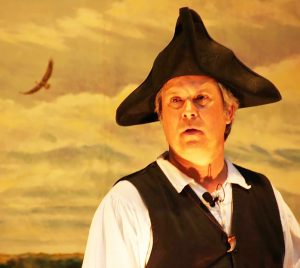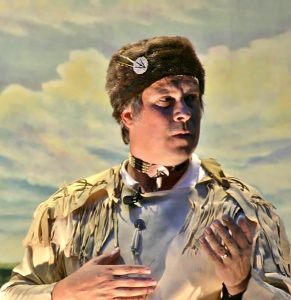Historic debate between Potawatomi chief and territorial governor comes to life
By Elise Zwicky For Chronicle Media — November 7, 2018
Local storyteller and historian Brian “Fox” Ellis will portray Illinois Territorial Governor Ninian Edwards in a free program Sunday, Nov. 11, at Shore Acres Park in Chillicothe. Edwards led a campaign on Nov. 8, 1812, that resulted in the burning of the French village of Peoria. Ellis said he hopes the program will spark a conversation and encourage people to think. (Photo courtesy of Brian “Fox” Ellis)
History comes alive in Chillicothe this weekend when local storyteller Brian “Fox” Ellis recreates a dramatic debate between Illinois Territorial Governor Ninian Edwards and Potawatomi Chief Gomo at the place where Gomo’s village once stood more than 200 years ago.
The free program will be held at 2 p.m. Sunday, Nov. 11, in the clubhouse at Shore Acres Park, 100 Park Blvd.
“It’s always fascinating to me to be able to recreate a moment in history in the very same place where it happened,” said Ellis, who’s been performing one-man show historical reenactments for 38 years. “It’s very meaningful, I think, for Chillicothe.”
Written and performed by Ellis, the program is part of a statewide tour celebrating Illinois’ Bicentennial. It’s funded by Humanities Illinois and the Forgotten Illinois Grant and is also being sponsored by the Chillicothe Historical Society and the Chillicothe Park District.
“Two hundred years ago, as the original 13 colonies were bursting at the seams, as early pioneers came flooding over the Alleghenies and the tribes of the east were being pushed to the west, as Illinois was struggling to become a state, there were a series of events that are often left out of our history books,” Ellis wrote about the performance.
“Yet these events were pivotal in forever shaping our state history and influencing our nation’s relations with Native Americans. From the War of 1812 to the burning of the French Village of Peoria and the Fort Dearborn Massacre in Chicago, this engaging program will challenge the audience to reconsider what they think they know about Illinois’ story.”
In the first half of the program, the audience will meet Illinois Territorial Governor Ninian Edwards as he speaks about his role in the War of 1812 and the burning of Peoria, the creation of Illinois’ state constitution and the Cahokia Council with the Indians.
On Nov. 8, 1812, Edwards led the campaign that resulted in the burning of a Native American village on the east side of the Illinois River and the burning of the French village of Peoria. Chief Gomo, who was hunting nearby at the time, rescued the women and children from the village who were left to die or fend for themselves after the French men were taken prisoner.

Local storyteller and historian Brian “Fox” Ellis will portray Potawatomi Chief Gomo in a free program Sunday, Nov. 11, at Shore Acres Park in Chillicothe on the spot where Gomo’s village once stood more than 200 years. The program is part of a statewide tour celebrating Illinois’ Bicentennial. (Photo courtesy of Brian “Fox” Ellis)
After Ellis’ portrayal of Edwards, there will be a brief intermission in which Ellis will change characters the way some folks change shirts. He will return as Gomo and will share the well-respected chief’s side of the story, as well as touch on Gomo’s relationships with the other principal chiefs of the region–including Black Hawk, Tecumseh, and The Prophet–his relationship to the Fort Dearborn Massacre and his speech responding to the governor.
Much of the text for the program is taken directly from the speeches Edwards and Gomo delivered to each other at Cahokia as they squared off to determine the future of the Illinois Valley region, Ellis said.
During the short intermission, a host will ask the audience questions and lead them in a brief discussion about what Ellis-as-Edwards has just told them. “Those questions will set the audience up to help them make the adjustment to now hear the same story from a different point of view,” Ellis added. “It is very much the same story but from two totally different points of view, two different world views and even two different styles of telling the story. So it’s a bit of a cultural and character transformation for me to become these two characters.”
While researching the characters, Ellis said what struck him about Ninian Edwards was that he was a surprisingly well-connected individual. His father helped ratify the U.S. Constitution as a delegate and he was recommended as territorial governor of Illinois by U.S. Sen. Henry Clay, who unsuccessfully ran for president in 1824, 1832 and 1844.
The thing I really like about Ninian Edwards is that he was a major player,” Ellis said. “Probably the most heroic thing he did was when cholera came through. He was trained as a lawyer not as a doctor, but he volunteered as a medical aide in Edwardsville and saved the lives of others, and that self-sacrifice is what killed him. It’s one of my favorite stories about him because it shows his humanity in spite of some of the other mistakes he made.”
What struck Ellis about Gomo was how well-respected he was. “At Cahokia, 20 chiefs stood up and everyone to the man said Gomo will speak for us. He was also very well connected. He knew Tecumseh and Blackhawk and all the other major chiefs. And he went east with a delegation of local chiefs and met President Washington,” Ellis said.
The program, which will last about an hour, is recommended for ages 10 and up. Ellis hopes the performance will encourage the audience to think and to start a conversation.
“I want to give them the truth of history, and it’s not always a pretty story. But I think the audience responds well to history, warts and all. And then they can kind of decide for themselves what to think about it,” he said.
“Who we are as a nation are the stories we tell, and how we know ourselves and our connection to history is through the stories we tell,” Ellis added. “I also think part of my job is to give voice to the voiceless. To give a platform for people who are often left out of our history books.”
The performance is one of more than 20 Ellis will be giving throughout the state in November that explore the American Indian perspective on Illinois’ Bicentennial. The program is free but donations will be appreciated to offset expenses. For more information about Brian “Fox” Ellis, visit his website at www.foxtalesint.com.







